How can I print the Request Payload data to the page via JSTL?

In the image above I am sending a post to a jstl controller. Now I can access the query string parameters easily e.g. ${param.test} will print out the test parameter.
But I am not sure how to access the data in the Request Payload I have tried the ${requestScope} object ${requestScope.PAY} but the data does not seem to be there.
Is there an accessible object that holds this data? If not what is the best work around?
Update
I don't know how relevant, but I am using angular's $http.post for the call.